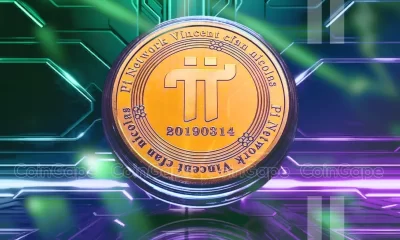Opinion
Ending the Treasury Department’s Regulatory Overreach on Crypto Mixer Tornado Cash
Published
2 weeks agoon
By
admin

Cryptocurrency users who crave privacy protections had a lot to be thankful for this past Thanksgiving.
Two days before the holiday, a unanimous three-judge panel of the Fifth Circuit ruled that the Treasury Department’s Office of Foreign Assets Control (OFAC) had acted in an arbitrary and capricious manner not supported by substantial evidence when it “overstepped its congressionally defined authority” in sanctioning “Tornado Cash’s open-source, self-executing software” instead of “the rogue persons and entities who abuse it.”
In plain English, Congress didn’t give OFAC the power to do what it did: sanction software code owned by no one.
But let’s back up. As I have explained for CoinDesk before, Tornado Cash is a crypto mixer that makes it tougher to trace cryptocurrency transactions. There are many legitimate and legal uses of such a service, but there are illegal uses too. For example, cyber criminals and hostile state actors have used Tornado Cash and other services to shield their nefarious acts.
Because of the latter actions, OFAC added many Tornado Cash addresses to its Specifically Designated National and Blocked Persons (SDN) list.
But under the relevant statutory provisions, Congress gave OFAC only the power to sanction the property, including any interest in the property, of certain people.
And here, the court, in an opinion written by Judge Don Willett, said that the immutable smart contracts at issue didn’t constitute property, so OFAC couldn’t sanction them.
The court said “because that element is dispositive, [it] need not address the other elements” at issue in the case. It said that the “district court erred in giving ‘heightened deference’ to OFAC’s definition of ‘property’ and in finding that immutable smart contracts met that definition.”
Because of the U.S. Supreme Court’s Loper Bright decision from last term doing away with Chevron deference — the requirement that courts defer to agency interpretations of ambiguous statutory (or even regulatory!) provisions — the court said it was engaging in the “unremarkable, yet elemental proposition” of applying its own judgment to determine what a statute means.
Doing that, the court said that under both the plain meaning of property and under OFAC’s regulatory definition of property, the term means something that can be owned. And in this case, the immutable smart contracts at issue did not qualify as property because they cannot be owned.
The court went further, though, and made two points that might have implications for crypto and smart contracts more broadly.
First, the court said the immutable smart contracts at issue are not themselves contracts — despite their misleading name and contrary to what the district court held.
While the district court found the contracts to be “merely a code-enabled species of unilateral contracts,” the Fifth Circuit panel said that in “so finding, the district court ignored basic principles of black-letter contract law.” It explained that all contracts require at least two parties, but here, the immutable smart contracts “have only one party in play” because they are “just software code,” not a party who can contract with another party.
The Fifth Circuit made clear that its decision is not contrary to the “blockchain caselaw,” which indicates that some smart contracts could, in fact, function as contracts because in those other cases, at least two willing parties agreed to enter into the contract. But here, with the ownerless immutable smart contracts, “there is no party with which to contract.”
Second, the court held that the immutable smart contracts at issue are not themselves a service but are “more like a tool that is used in performing a service,” which is “not the same as being a service.”
Finally, the court ended with a note on its proper role within our constitutional system of government. It said that while it “readily recognize[s] the real-world downsides of certain uncontrollable technology falling outside of OFAC’s sanctioning authority,” courts “must uphold the statutory bargain struck (or mis-struck) by Congress, not tinker with it.” It declined to engage in “judicial lawmaking” by mending the “statute’s blind spots or smoothing out its disruptive effects.” It said to do so “falls outside of [the court’s] lane” because “Legislating is Congress’s job — and Congress’s alone.”
It’s unclear whether the government will ask the full Fifth Circuit to review the decision or whether it will ask the U.S. Supreme Court to review it. Notably, the Eleventh Circuit still has a similar case pending before it. If it reaches a different conclusion or uses different reasons to reach even the same, or a similar, conclusion, that could motivate the Supreme Court to review the case.
Of course, it will be interesting to see what position the incoming Trump Administration will take on this case too. It may very well be that the new administration will agree that the Biden Administration’s OFAC should not have taken this unprecedented action.
And, of course, Congress could always act too.
So, for now, it’s good news for the crypto community. But the story is far from over.
Source link
You may like


BNB Steadies Above Support: Will Bullish Momentum Return?


Metaplanet makes largest Bitcoin bet, acquires nearly 620 BTC


Tron’s Justin Sun Offloads 50% ETH Holdings, Ethereum Price Crash Imminent?


Investors bet on this $0.0013 token destined to leave Cardano and Shiba Inu behind


End of Altcoin Season? Glassnode Co-Founders Warn Alts in Danger of Lagging Behind After Last Week’s Correction


Can Pi Network Price Triple Before 2024 Ends?



Recently, BlackRock released an educational video explaining Bitcoin, which I thought was great—it’s amazing to see Bitcoin being discussed on such a massive platform. But, of course, Bitcoin X (Twitter) had a meltdown over one specific line in the video: “There is no guarantee that Bitcoin’s 21 million supply cap will not be changed.”
HealthRnager from Natural News claimed, “Bitcoin has become far too centralized, and now the wrong people largely control its algorithms. They are TELLING you in advance what they plan to do.”
Now, let me be clear: this is total nonsense. The controversy is overhyped, and the idea that BlackRock would—or even could—change bitcoin’s supply is laughable. The statement in their video is technically true, but it’s just a legal disclaimer. It doesn’t mean BlackRock is plotting to inflate bitcoin’s supply. And even if they were, they don’t have the power to pull it off.
Bitcoin’s 21 million cap is fundamental—it’s not up for debate. The entire Bitcoin ecosystem—miners, developers, and nodes—operates on this core principle. Without it, Bitcoin wouldn’t be Bitcoin. And while BlackRock is a financial giant and holds over 500,000 Bitcoin for its ETF, its influence over Bitcoin is practically nonexistent.
Bitcoin is a proof-of-work (PoW) system, not a proof-of-stake (PoS) system. It doesn’t matter how much bitcoin BlackRock owns; economic nodes hold the real power.
Let’s play devil’s advocate for a second. Say BlackRock tries to propose a protocol change to increase bitcoin’s supply. What happens? The vast network of nodes would simply reject it. Bitcoin’s history proves this. Remember Roger Ver and the Bitcoin Cash fork? He had significant influence and holdings, yet his version of bitcoin became irrelevant because the majority of economic actors didn’t follow him.
If Bitcoin could be controlled by a single entity like BlackRock, it would’ve failed a long time ago. The U.S. government, with its endless money printer, could easily acquire 10% of the supply if that’s all it took to control Bitcoin. But that’s not how Bitcoin works. Its decentralized nature ensures no single entity—no matter how powerful—can dictate its terms.
So, stop worrying about BlackRock “changing” Bitcoin. Their influence has hard limits. Even if they tried to push developers to change the protocol, nodes would reject it. Bitcoin’s decentralization is its greatest strength, and no one—not BlackRock, not Michael Saylor—can change that.
This article is a Take. Opinions expressed are entirely the author’s and do not necessarily reflect those of BTC Inc or Bitcoin Magazine.
Source link
Opinion
It’s Time to Admit It – There Are Only 2.1 Quadrillion Bitcoins
Published
2 days agoon
December 21, 2024By
admin
If the above statement offends you, you might not have read the Bitcoin source code.

https://x.com/pete_rizzo_/
Of course, I’m sure you’ve heard that there are 21 million bitcoin – and this is true, the Bitcoin protocol allows for only “21 million bitcoin” to be created, yet these larger denominations can be subdivided into 100 million sub-units each.
Call them whatever you want, there are only 2.1 quadrillion monetary units in the protocol.
This dollars and cents differential has long been the subject of debate – in the time of Satoshi, Bitcoin’s creator, the dual conventions, Bitcoin having both a bulk denomination, and a smaller unit, was not much of a concern. There were questions about whether the software would work at all, and bitcoin were so worthless, selling them in bulk was the only rational option.
Rehashing this debate is BIP 21Q, a proposal to the Bitcoin users authored by John Carvalho, founder of Synonym, creator of the Pubky social media platform, and a tenured contributor whose work dates back to the days of the influential Bitcoin-assets collective.
In short, the BIP proposes that network actors – the various wallets and exchanges – change how Bitcoin denominations are displayed, with the smallest unit of the protocol renamed “bitcoins,” as opposed to “satoshis,” as they have been commonly called.
Here are the specifics of the BIP:
Redefinition of the Unit:
- Internally, the smallest indivisible unit remains unchanged.
- Historically, 1 BTC = 100,000,000 base units. Under this proposal, “1 bitcoin” equals that smallest unit.
- What was previously referred to as “1 BTC” now corresponds to 100 million bitcoins under the new definition.
Terminology:
- The informal terms “satoshi” or “sat” are deprecated.
- All references, interfaces, and documentation SHOULD refer to the base integer unit simply as “bitcoin.”
Display and Formatting:
- Applications SHOULD present values as whole integers without decimals.
- Example:
- Old display: 0.00010000 BTC
- New display: 10000 BTC (or ₿10000)
Unsurprisingly, the debate around the BIP has been hostile. For one, it’s not a technical BIP, though this is not a requirement of the BIP process. Suffice to say, it’s perhaps the most general BIP that has been proposed under the BIP process to date, as it mainly deals with market conventions and user onboarding logic, not any changes to the software rules.
However, I have to say, I find the proposal compelling. Nik Hoffman, our News Editor, does not, preferring to stick to the market affirmative.
Yet, I think the proposal raises relevant questions: why should new users be forced to compute their Bitcoin balances using only decimals? Surely this has the adverse side effect of making commerce difficult – it’s simply antithetical to how people think and act today.
Also, in terms of savings, at an $100,000 BTC price, it isn’t exactly compelling to think you could be spending a whole year earning 1 BTC, though that may be.
Indeed, there have been various debates for all kinds of units – mBTC, uBTC – that play around with the dollars and cents convention, but Carvalho here is wisely skipping to the end, preferring just to rip the band-aid off. $1 would buy 1,000 bitcoins under his proposal.
What’s to like here, and I argued this during a Lugano debate on the topic in 2023, is that it keeps both the larger BTC denomination and the smaller unit, now bitcoins. They are both important, and serve different functions.
My argument then was that having a larger denomination like BTC (100 million bitcoins) is important. If there was no “BTC unit,” the press and financial media would be faced to reckon that “1 bitcoin” is still worth less than 1 cent.
How much mainstream coverage and interest do we think there would be? I’d bet not very much.
In this way, BIP 21Q is a best-of-both-worlds approach.
The financial world, press, and media can continue championing the meteoric rise in value of “BTC,” while everyday users can get rid of decimals and complex calculations, trading the only real Bitcoin unit guaranteed to exist in perpetuity.
This article is a Take. Opinions expressed are entirely the author’s and do not necessarily reflect those of BTC Inc or Bitcoin Magazine.
Source link
Bitcoin spot ETF
We Need In-Kind Redemptions For The Spot Bitcoin ETFs
Published
2 days agoon
December 21, 2024By
admin


On a recent episode of the Coinage podcast, guest SEC Commissioner Hester Peirce said that she is open to reconsidering in-kind redemptions for spot bitcoin ETFs.
(For those who aren’t familiar with the term “in-kind redemption,” it refers to the ability to withdraw the bitcoin you’ve purchased via an ETF into your own custody. In essence, it turns a bitcoin IOU into the real thing.)
BREAKING: SEC Commissioner Hester Peirce previews new pro-crypto changes coming to the SEC
ETF in-kind redemptions and ability for ETF issuers to begin staking likely done "early on"
Both ETFs now have more than $100B in AUM pic.twitter.com/g3jtbuBeWU
— Coinage (@coinage_media) December 20, 2024
This makes my heart happy, as bitcoin wasn’t designed to exist trapped within the wrappers of the old system. It was built to set us free from that system.
If Peirce can work with the incoming SEC Chair, Paul Atkins, to facilitate the approval of in-kind redemptions then the spot bitcoin ETFs can serve as some of the biggest on-ramps to Bitcoin, as Bitwise co-founder Hong Kim put it, as opposed to simply existing as speculation vehicles.
Bitcoin was born to exist in the wild. It wasn’t born to exist in a Wall Street zoo.
In-kind redemptions would allow the bitcoin currently trapped within the zoo the ability to return to its natural habitat.
This article is a Take. Opinions expressed are entirely the author’s and do not necessarily reflect those of BTC Inc or Bitcoin Magazine.
Source link

BNB Steadies Above Support: Will Bullish Momentum Return?

Metaplanet makes largest Bitcoin bet, acquires nearly 620 BTC

Tron’s Justin Sun Offloads 50% ETH Holdings, Ethereum Price Crash Imminent?

Investors bet on this $0.0013 token destined to leave Cardano and Shiba Inu behind

End of Altcoin Season? Glassnode Co-Founders Warn Alts in Danger of Lagging Behind After Last Week’s Correction

Can Pi Network Price Triple Before 2024 Ends?

XRP’s $5, $10 goals are trending, but this altcoin with 7,400% potential takes the spotlight

CryptoQuant Hails Binance Reserve Amid High Leverage Trading

Trump Picks Bo Hines to Lead Presidential Crypto Council

The introduction of Hydra could see Cardano surpass Ethereum with 100,000 TPS

Top 4 Altcoins to Hold Before 2025 Alt Season

DeFi Protocol Usual’s Surge Catapults Hashnote’s Tokenized Treasury Over BlackRock’s BUIDL

DOGE & SHIB holders embrace Lightchain AI for its growth and unique sports-crypto vision

Will Shiba Inu Price Hold Critical Support Amid Market Volatility?

Chainlink price double bottoms as whales accumulate
182267361726451435

Why Did Trump Change His Mind on Bitcoin?

Top Crypto News Headlines of The Week

New U.S. president must bring clarity to crypto regulation, analyst says

Will XRP Price Defend $0.5 Support If SEC Decides to Appeal?

Bitcoin Open-Source Development Takes The Stage In Nashville

Ethereum, Solana touch key levels as Bitcoin spikes

Bitcoin 20% Surge In 3 Weeks Teases Record-Breaking Potential

Ethereum Crash A Buying Opportunity? This Whale Thinks So

Shiba Inu Price Slips 4% as 3500% Burn Rate Surge Fails to Halt Correction

Washington financial watchdog warns of scam involving fake crypto ‘professors’

‘Hamster Kombat’ Airdrop Delayed as Pre-Market Trading for Telegram Game Expands

Citigroup Executive Steps Down To Explore Crypto
Mostbet Güvenilir Mi – Casino Bonus 2024

NoOnes Bitcoin Philosophy: Everyone Eats
Trending

 3 months ago
3 months ago182267361726451435

 Donald Trump5 months ago
Donald Trump5 months agoWhy Did Trump Change His Mind on Bitcoin?

 24/7 Cryptocurrency News4 months ago
24/7 Cryptocurrency News4 months agoTop Crypto News Headlines of The Week

 News4 months ago
News4 months agoNew U.S. president must bring clarity to crypto regulation, analyst says

 Price analysis4 months ago
Price analysis4 months agoWill XRP Price Defend $0.5 Support If SEC Decides to Appeal?

 Opinion5 months ago
Opinion5 months agoBitcoin Open-Source Development Takes The Stage In Nashville

 Bitcoin5 months ago
Bitcoin5 months agoEthereum, Solana touch key levels as Bitcoin spikes

 Bitcoin5 months ago
Bitcoin5 months agoBitcoin 20% Surge In 3 Weeks Teases Record-Breaking Potential


